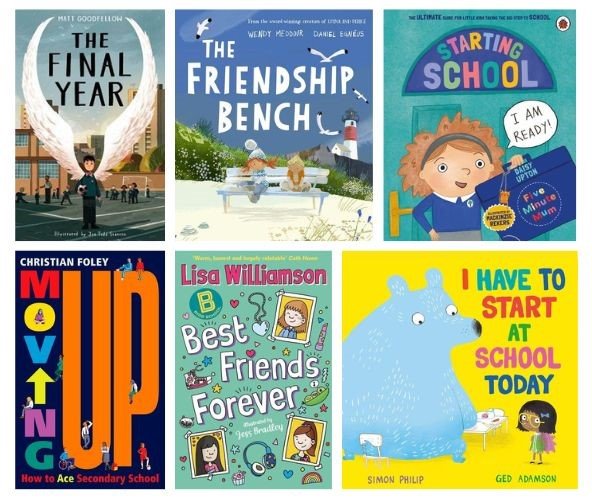We're delighted to share with you our latest blog in our series, Library Lifeline, written in association with the School Library Association.
This series is designed to support anyone working in a school library by answering their questions directly. If you have a question that you’d like to ask our ‘agony aunt’ – the SLA’s Member Development Librarian, Dawn Woods – then please email us at worldofstories@literacytrust.org.uk and your question may be the focus of a future blog!
Is there any way that the school library can support our Year 6 pupils as they move on to big school in September?
Primary School Librarian
As the end of the school year beckons, we naturally start to consider those pupils about to take the next significant step in their learning journey. In this latest blog, Dawn Woods provides suggestions about how the school library can support pupils during these milestones.
School transitions and their effects
Transition = the process or a period of changing from one state or condition to another. Or, to children = a scary time.
Any change takes some adjusting to and can leave young children feeling very bewildered.
It’s important to remember that while starting secondary school is a very big transition, we also need to support children transitioning from a home to a school environment at age four, or moving from one school to another, which are also major transitions.
We can help this transition in many ways by preparation beforehand.
What role can the school library play?
Most schools hold days where children starting at that school come in to see the physical space and meet the appropriate staff. This helps build emotional and social links.
The school library can help with this. Send home a booklist of books which deal with themes of change, (such as the National Literacy Trust’s Books for Big Change) or even better, if possible, make books available to be borrowed on the transition days.
The school library space itself can be a great source of comfort and sanctuary for children. In times of transition and the uncertainty that can accompany that, make sure that pupils are well aware of how welcome they are in their new library space and set it up so that displays or spotlights for new users emphasise the message of welcome.
Utilise your pupil librarians
Use your reading ambassadors to greet new pupils and ‘buddy up’ with them to support them in the space and make some personalised recommendations.
Let them explain to the younger pupils how everything works. New pupils will know they can approach a peer, which may be less intimidating than approaching an adult!
Pupils could even go with you on a visit to the secondary school and meet with their pupil library assistants to swap tips. You could even invite in the secondary pupil library assistants to your school, helping children understand that they are welcome and part of a larger community.
Our practical tips for supporting children's first visits to school
Practical advice for 4-year-olds on their visits to school
- Read your 4-year-old pupils a story about starting school to reassure them. Neil Gaiman and Adam Rex’s Chu’s First Day of School, as well as Queen of the Classroom, by Derrick Barnes and Vanessa Brantley-Newton are the perfect picture books for this scenario.
- Take your visiting 4-year-olds into the school library to see the space and let them explore.
- Show them where books are and read to them in the space.
- Ask them what they enjoy reading and show them you have books on that subject.
- Talk to parents about the availability of books about starting school. Provide them with a list, preferably annotated to show if your local library holds them.
- Author Simon Philip has developed a Meet-the-Author event called I Really Want to READ which aims to promote parents’ engagement with their child’s reading at the start of their school journey, and sharing books for pleasure. More details can be found by contacting Simon Philip via his website: www.simon-philip.com.
Practical advice for year 6 children during their school transition
- Can you liaise with staff in a secondary school and invite in their school librarian? This will help build a relationship beforehand so pupils are not wary of approaching them when they start the new year.
- Pass on details of the popular reads in your school as the secondary schools may purchase copies so pupils recognise titles when they enter the new space and feel comforted by the familiarity.
- Collect a list of questions your year 6 may have about the library – do they have books by X or about Y, what library clubs do they offer? Share this with your colleagues in secondary school, then feed back the answers to your pupils in good time to reassure.
- Pass on names of the children doing the Summer Reading Challenge in public libraries over the summer and ask if these can be followed up and celebrated in September.
- Do your secondary schools take part in Bookbuzz, the programme giving books to new Year 7s, paid for by secondary schools? It does what it says on the tin and creates a buzz around the chosen titles and again, helps pupils feel like they belong to a community.
- Could you gain funding from your contacts or those of the secondary schools’ to purchase a title to give to all leavers to read over the summer break and know it will be talked about in their library lessons in September? Many secondary schools do this and will welcome suggestions of titles to purchase. It usually needs to be a more recent title as fewer students will have read it.
Using the school library during September school inductions
In September when pupils start school, make sure you include library induction time in their school day. The scope of their new library and the way that books are categorised may be very different to what they are used to.
- Explain how the library works
- how many books they are allowed to borrow, and
- how to borrow books
- Have games such as a treasure trail around the library using different resources or subjects.
Once again, capitalise on the power of peer reading role models and involve your existing pupil librarians.
Quick and handy recommendations for school transition
Our key takeaway is to focus on creating an inviting environment. The school library can be a place of tranquillity, socialisation, discovery, and creativity. To help pupils function at their best, ensure that they know this space is for them, from the very start.
Then, it's helpful to have a range of books available for pupils to access. A list of suitable books for transition is available on the SLA website but we have also created a quick list of some popular titles.
If you are receiving new pupils into your library and reading spaces, these books are a good place to start.

Recommended books for children starting school:
- The Friendship Bench, by Wendy Meddour and Daniel Egneus. A shy young girl starting a new school finds a friend with the help of the friendship bench.
- Starting School, by Daisy Upton. This picture books is, unsurprisingly, all about starting school.
- I Have to Start at School Today, by Simon Philip and Ged Adamson. A reassuring rhyming story about starting school.
Recommended books about school transition for Year 6:
- Moving Up, by Christian Foley. Helpful for children moving up to secondary.
- The Final Year, by Matt Goodfellow and Joe Todd-Stanton. Navigating change in schools, changes in friendships and changes within family.
- Best Friends Forever, by Lisa Williamson and Jess Bradley. Moving up to secondary school.
Further resources around using your library during school transition
We have developed a suite of school transition teaching resources for both primary and secondary schools to support reading during transition from year 6 to year 7. These resources are available with Premium Membership.
Our Books for Big Change list is free to access.
